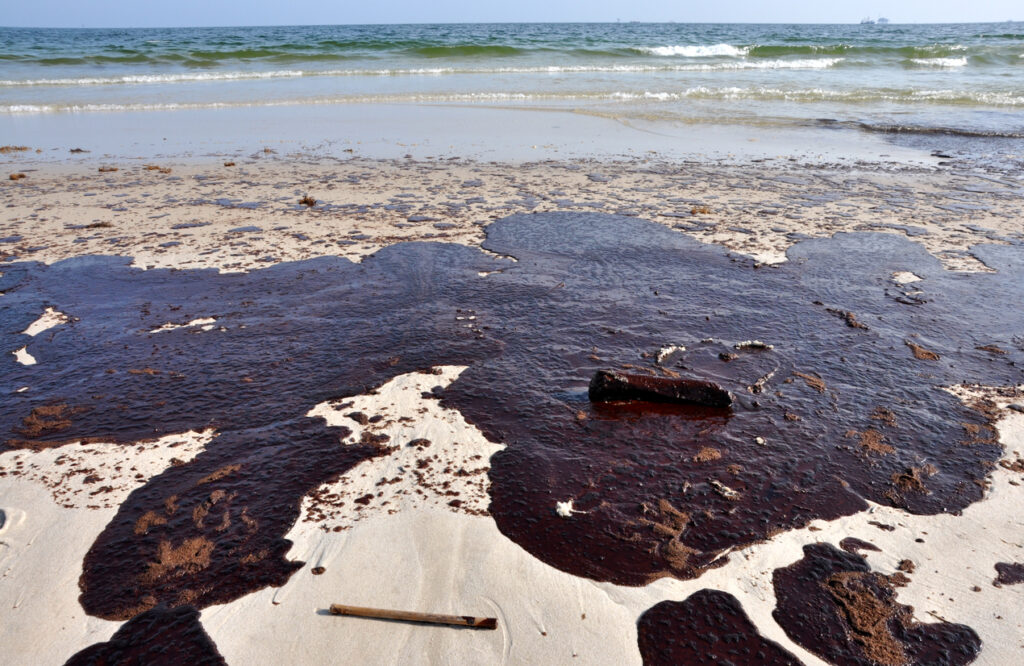
NCEL Blog
Deepwater Horizon: Offshore Drilling in the States 10 Years Later
April 20, 2020
Today marks the 10th anniversary of the BP Deepwater Horizon disaster, the worst oil spill in U.S. history. The accident killed 11 crew members, releasing over 200 million gallons of oil into the Gulf of Mexico, disrupting coastal economies dependent on fishing and tourism, and causing environmental damage that lasts to this day. The disaster was a wake-up call to the inherent dangers posed by the offshore drilling industry and the lack of federal oversight on drilling safety.
A new report by Oceana details the full scope of impacts from Deepwater Horizon in the years after the spill. On the economic front alone, the disaster accounted for:
- A loss of more than $500 million to the recreation industry.
- A loss of nearly $1 billion to the seafood industry due to fishery closures and drop in demand.
- A five-year price decline of 4% to 8% in the regional housing market.
The spill severely impacted marine species and their habitat, diminishing bird and fish populations and harming endangered species such as the Bryde’s Whale and Kemp’s Ridley Sea Turtle. Even ten years later, marine species and habitats of the Gulf Coast have still not fully recovered. Because of this, elected officials of coastal states pushed the federal government to issue stronger regulations for offshore drilling and have continued to advance legislative protections for their shoreline communities.

Response and Regulatory Reform:
The spill prompted actions by the federal government and states to help prevent future disasters. Some states like North Carolina passed legislation to improve state-level response to potential spills, review of coastal oil and gas facility leases so that they met standards for safety, and ensure coastal communities can recover financial damages through stricter industry liability.
President Obama issued an executive order in the month following the spill creating a special commission to investigate the causes of the Deepwater Horizon accident, and to examine the state of the offshore drilling industry to see what reforms needed to be made. In 2011, the commission released a report and set of recommendations, one of which was the creation of a new independent agency for offshore energy exploration. Later that year, the Bureau of Safety and Environmental Enforcement (BSEE) was created. Tasked with improving safety and environmental protections in the offshore energy industry, BSEE implemented new regulations to protect rig workers and improved overall enforcement with more regular inspections.
In 2016, the agency also issued new rules on drilling practices to prevent potential spills including stricter guidelines on blow-out preventers, a mechanism whose failure was the primary cause of the BP spill.
Offshore Drilling Expansion
January 2018, following a call for increasing fossil fuel development, the Trump Administration released its draft 2019-2024 National Outer Continental Shelf Oil and Gas Leasing Program. The plan proposed expanding offshore drilling and exploration to more than 90 percent of US waters, inclusive of the Atlantic Coast, Pacific Coast, and Eastern Gulf of Mexico, areas that have historically been unavailable to drilling. The following year, the Administration also announced rollbacks to safety regulations that were put in place following the BP Deepwater Horizon accident. Having seen what one spill could do, coastal states were quick to respond to these developments.
Pushback from States
Shortly after the release of the leasing plan, over 200 legislators representing 17 coastal states signed a letter to the Secretary of the Interior calling for an immediate halt to drilling expansion. These legislators were part of a chorus of opposition from 300 municipalities and over 2,000 local, state, and federal elected officials to new offshore drilling and exploration efforts.
To protect their coastlines and local communities from the threat of oil spills like Deepwater Horizon, states began introducing legislation to either ban or significantly block exploration and drilling activities in their state waters. California, Delaware, Maryland, and New Jersey were the first states to pass offshore drilling protections in response to the Trump Administration’s proposal in 2018. Several more states joined the push-back in the following years.
Successful State Legislation
Today, ten coastal states have some form of offshore drilling ban in place, barring the practice in state waters and making it prohibitive for the industry to take hold in adjacent federal waters. Here’s a list of state bans enacted since 2018:
- New Jersey (AB 839)
- Delaware (SB 200)
- Maryland (HB 1456)
- California (SB 834/AB 1775)
- Florida (Amendment 9)
- New Hampshire (SB 76)
- Maine (LD 955)
- New York (A 2572)
- Oregon (SB 256)
- Virginia (SB 795/HB 706)
Ongoing Battle
Though the proposed plan to open up more coastal waters to drilling has stalled, states continue to advance policies to block offshore drilling expansion knowing that may change in the future.
The current administration continues to roll back environmental regulations and safety reforms. This comes at a time when the industry is seeking new fossil fuel resources in deeper waters, just as the Deepwater Horizon was doing. According to a recent E&E News article, there has been a “73% increase in deepwater wells over the last two decades and a nearly 200% increase in deepwater production.” Combined with a troubling trend of smaller, under-resourced rig operators buying up older infrastructure in shallow water, the chances of another accident occurring is on the rise.
Coastal states are working to help prevent future disasters by blocking new oil and gas infrastructure, ensuring financial liability for accidents placed fully on the industry, and by incentivizing more renewable energy to transition away from fossil fuels.
Additional Resources
- NCEL’s Offshore Drilling page.
- Oceana’s Hindsight 2020 Report on the BP spill.
- Article: A Decade After the Deepwater Horizon Explosion, Offshore Drilling Is Still Unsafe – EcoWatch